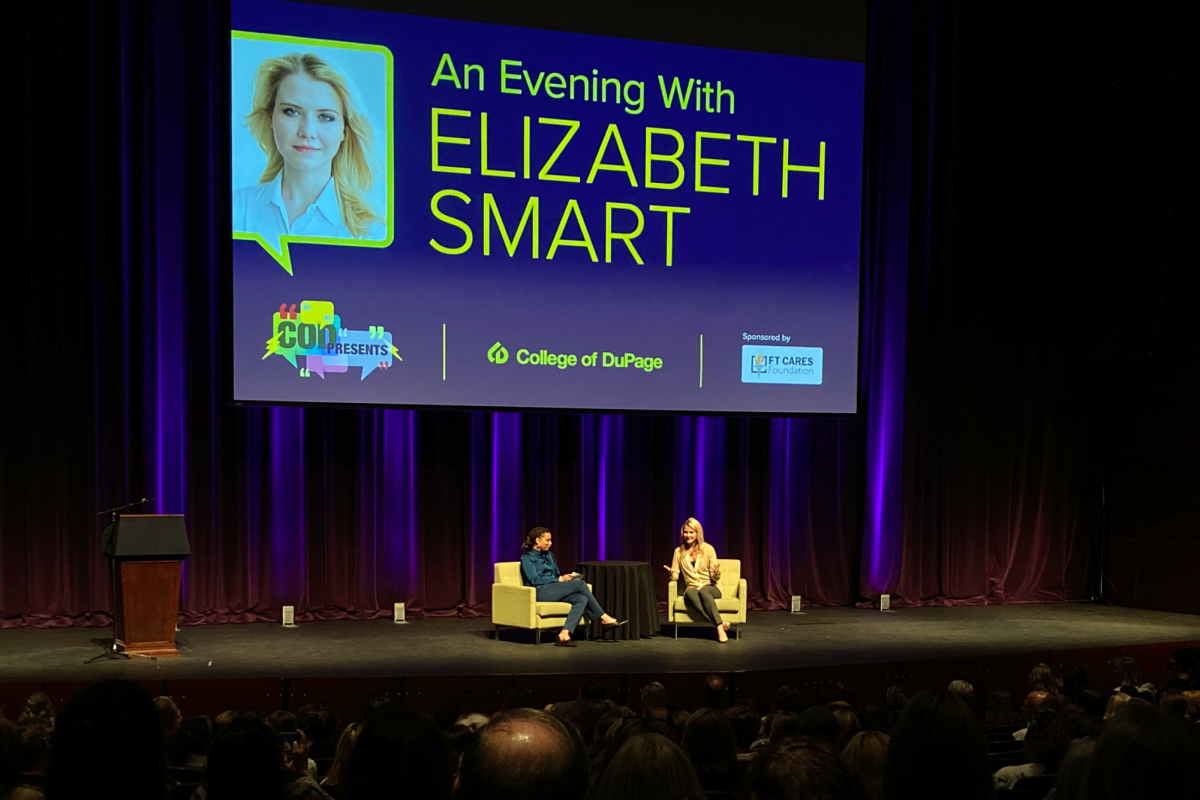Imagine waking up in the dead of night, with the cold sting of a knife pressed against your throat. An unknown man tells you to be quiet and to follow him. This was the experience of Elizabeth Smart in 2002 when she was kidnapped at 14 years old. After being rescued nine months later, Smart is now an activist and supporter for victims of child abduction and spends her time traveling the country telling her story, including at the College of DuPage.
Smart made national news back on June 5, 2002, when she was abducted by Brian David Mitchell, who brought Smart to a campsite to meet up with his wife and co-captor, Wanda Barzee. Smart was rescued 9 months later on March 12, 2003, when witnesses saw her, Mitchell and Barzee in public and reported the trio to the authorities. Both Mitchell and Barzee pleaded guilty and were convicted for their actions involved with the kidnapping. In 2013, Smart wrote a book called “My Story” with Chris Stewart, detailing her experience with her abduction in 2002.
On Oct. 19, the McAninch Arts Center hosted “An Evening with Elizabeth Smart.” The event was spent giving Smart the floor to talk about her experience followed by a Q&A section with Smart. The event started with Wendy Parks, vice president of public relations, communications and marketing, introducing Smart as speaker of the evening.
“In the short time that I’ve been able to engage with her,” Parks said. “She is an incredible human being. We are blessed and honored to be here tonight with her.”
Smart then emerged and thanked the audience for attending. She started by expressing just how outlandish her life now was and how she never imagined this was how her life would turn out.
“I never, ever imagined that I would go out and speak. Honestly, public speaking used to be one of my biggest fears,” she joked. “But along the way, I feel so appreciative because I feel like I’ve been able to learn so many things. I feel like it’s really helped me in moving forward and overcoming my past.”
She continued on about how she has learned three main things during her travels: one, that everyone has a story; two, people are defined by more than their traumas; and three, it was important for each individual to find time to be happy. All these lessons, Smart reflects, are important to the idea of moving on.
“When we have these great big moments in life, I think it’s so easy to just want to crawl into bed and pull the covers over our heads and never get out,” she said. “Honestly, it’s okay if we do that sometimes, but after we’ve taken that time, it’s important to pull the covers off, get out of bed and go try again.”
Smart then reflected on her own great big moment, the time when she was abducted from her family home when she was just 14.
“It was the night before I was about to graduate from junior high, I was excited for summer. And I remember going to bed,” she said. “There was nothing special about that night. There wasn’t anything that stood out about it. There was no premonition or feelings of foreboding, it was just any other night.”
Despite the lack of premonitions, Smart could still recount the words that woke her up.
“And the next thing I remember,” she said, “was hearing a voice say ‘I have a knife at your neck. Don’t make a sound. Get up and come with me.’”
She then recounted her long trek into the woods with her captor, who then left her in a tent before returning to assault her. Smart at the time was reminded of her Christian upbringing and the lectures on staying abstinent, which resulted in her believing that perhaps no one else would care for her after the assault. But in the aftermath, she remembered all the time she spent with her parents and found a way to keep fighting.
“My two captors could take away everything from me,” Smart said. “They could take my life from me if they wanted to. But they never take away the fact that my parents would always love me. Maybe nobody else would, but my parents always would. When I realized I had that, I knew I had something worth surviving for.”
After recounting her rescue, Smart then sat down for a Q&A session with COD’s dean of students, Nathania Montes, and then opened up the questions to the audience. The evening ended with Smart signing copies of her latest book “Where There’s Hope: Healing, Moving Forward, and Never Giving Up,” which was released in 2018.
“We shouldn’t be defined by the worst moment of our life. Each one of us is so much more than that,” Smart said. “Remember that this is just a moment in time. You have the rest of your life to make change. You have the rest of your life to move forward. You have the rest of your life to define who you are.”
For more information about Smart and her organization, check out her website. For more shows at the MAC, check out their online calendar with professional shows, college productions, orchestral performances and more.










Patricia • Oct 26, 2023 at 11:29 am
Very nice article! Thank you very inspirational.